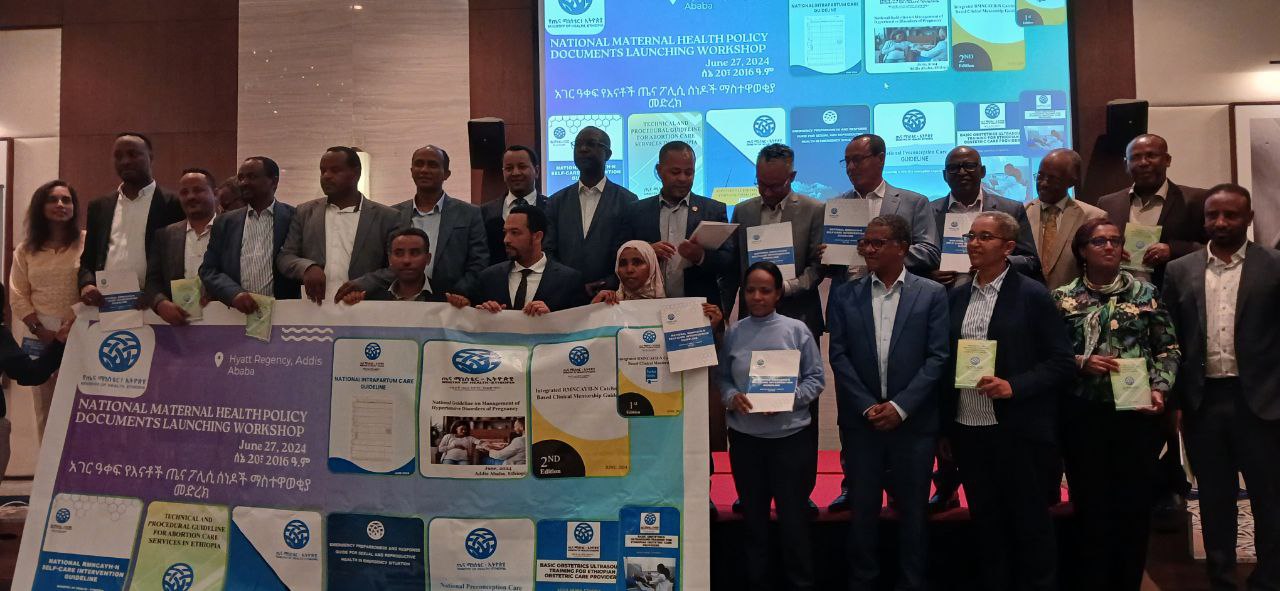New Maternal Health Policy Documents Launched at National Workshop

The Ethiopian Society of Obstetricians and Gynecologists (ESOG) participated in the launch of the new and revised Maternal Health Policy Documents. The event, organized by the Ministry of Health (MoH), was held at the Hyatt Regency in Addis Ababa on June 27, 2024. This significant milestone marks a major step forward in enhancing maternal health services across the nation.
The guidelines launched on the event include National Intrapartum Care Guideline, National Guideline on Management of Hypertensive Disorders of Pregnancy, Integrated RMNCAYH-N Catchment Based Clinical Mentorship Guideline (Second edition), Integrated RMNCAYH-N Catchment Based Clinical Mentorship (Pocket Guide 1st Edition), National RMNCAYH-N Self Care Intervention Guide, Technical and Procedural Guideline for Abortion Care Services in Ethiopia, Confidential Enquiry into Maternal and Prenatal Mortality and Morbidity, Emergency Preparedness and Response Guide for Sexual and Reproductive Health in Emergency Situation, National Preconception Care Guideline, Basic Obstetrics Ultrasound Training for Ethiopian Obstetric Care Providers Participants and Facilitarors Guide.
The primary objectives of the workshop were threefold: to disseminate the newly developed and revised policy documents, to create a platform for discussing these critical policies, and to mobilize resources while strengthening the commitment towards their implementation. The target audience included high-ranking officials from the Ministry of Health, representatives from regional health bureaus, donors and development partners, National Blood and Tissue Bank, professional associations, and the Ethiopian Health Care Federation.
The workshop commenced with a welcoming address delivered by Dr. Alemayehu Hunduma, Maternal, Child and Adolescent Health Service Lead Executive Office Acting lead officer and Sr. Zemzem Mohammed, National Maternal Health Desk Lead. H.E. Dr. Dereje Duguma, the State Minister of Health, provided the opening remarks, urging all stakeholders to take the newly launched guidelines and documents seriously and to work diligently towards their successful implementation.
The full day event was packed with insightful presentations on key components of the new policy documents. Takele Yeshewas, MoH.JSI Seiner Technical Adviser, discussed PCC and CBCM, while Sr. Zemzem addressed topics related to SRH and CE. Following a tea break organized by the event team, Dr.Zerihun Bogale, MoH./EH Seiner Technical Adviser, presented on CAC and Self-care, highlighting crucial aspects of the policies designed to improve maternal health outcomes.
Participants were then engaged in a comprehensive discussion session, facilitated by the presenter and various participants, which allowed for an in-depth exploration of the new policies and their potential impact.
The workshop also featured a presentation by AAU-PMA on PMA, moderated by Addisalem. This session further reinforced the need for data-driven approaches and continuous monitoring to ensure the effectiveness of the new policies.
The collaborative efforts of ESOG in developing these guidelines were acknowledged, underscoring the Society's pivotal role in shaping the future of maternal health services in the country. This workshop not only marked the launch of vital policy documents but also reinforced the collective commitment to enhancing maternal health care across Ethiopia. As these policies are implemented, ESOG remains dedicated to supporting their success and improving health outcomes for mothers and children nationwide.
 We are thrilled to see the recent approval of the national self-care guideline by the Ministry of Health. This landmark policy has the potential to revolutionize how women engage with and manage their health. Self-care empowers women to take charge of their wellbeing, leading to improved health outcomes and stronger health systems.
We are thrilled to see the recent approval of the national self-care guideline by the Ministry of Health. This landmark policy has the potential to revolutionize how women engage with and manage their health. Self-care empowers women to take charge of their wellbeing, leading to improved health outcomes and stronger health systems.